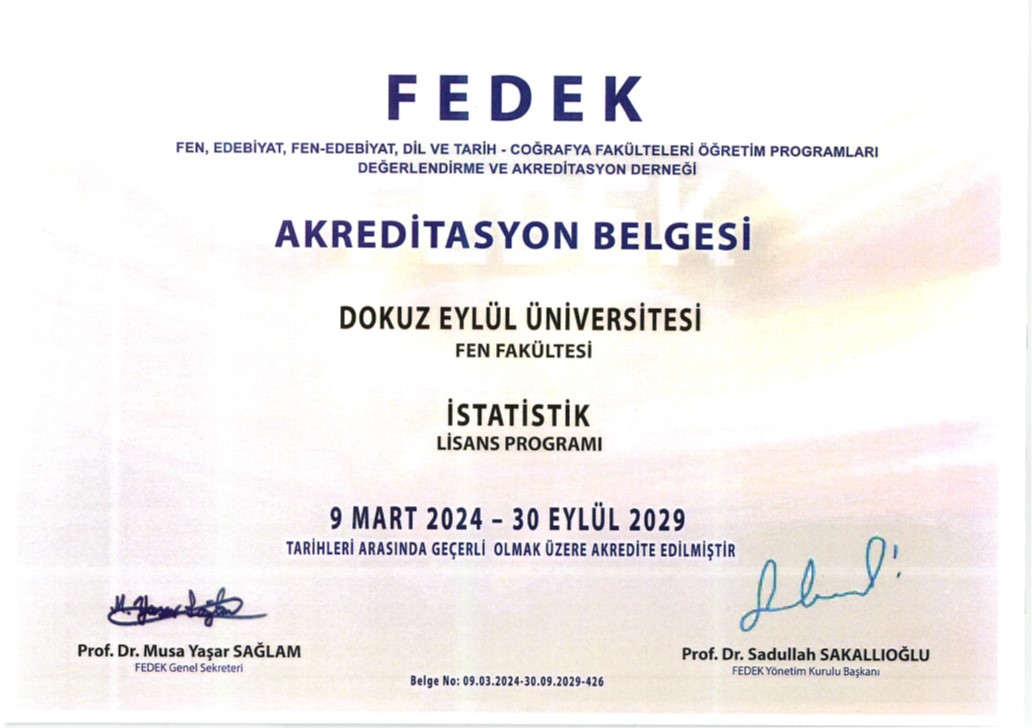EDUCATIONAL OBJECTIVES
The Educational Objectives (EO) of the DEU Statistics Department program are as follows:
EO1– To educate statisticians who have basic statistical knowledge, methods, and skills required for statistical expertise in analytical thinking, capable of conducting research and development with theoretical and practical knowledge and ethical values.
EO2– To assist graduates in becoming individuals who are sensitive to society and the environment, capable of following innovations in science and technology, and able to produce rational solutions to problems encountered in their fields, working towards the dissemination of a culture of data-based decision-making.
EO3– To graduate statisticians who are conscious of lifelong learning, able to use computer software and information and communication technologies at the required level of statistics, capable of following innovations.
EO4– To educate statisticians who are equipped with the infrastructure required to work with different disciplines, able to participate in teamwork, with developed sense of responsibility and duty, able to contribute to the institutions and country they serve.
PROGRAM OUTCOMES
Program Outcomes (PO), which define the knowledge, skills, and competencies that students must acquire until they graduate from the DEU Statistics program, are as follows:
PO1– Having knowledge of mathematics at the level required by the field of statistics, contemporary software used in data processing, and computer programming.
PO2– Ability to define problems using theoretical and applied knowledge in the field, collect necessary data within a plan, analyze and interpret data, and develop alternative solution proposals based on evidence and research.
PO3– Ability to take responsibility with a creative and broad perspective in individual or interdisciplinary teams, work effectively, and utilize time efficiently.
PO4– Ability to plan and manage projects with analytical thinking.
PO5– Ability to conduct source research for accessing information, critically evaluate acquired knowledge, and use databases and other information sources.
PO6– Ability to continuously renew oneself in the field by following developments in science and technology with awareness of the necessity of lifelong learning.
PO7– Ability to inform relevant individuals and institutions about topics related to statistics, and to communicate thoughts and solution proposals for problems in written and oral form.
PO8– Ability to organize and implement projects and activities for the social environment with a sense of social responsibility.
PO9– Ability to follow knowledge in the field and communicate with colleagues using English as a foreign language.
PO10– Ability to use computer software and information and communication technologies at the level required by the field of statistics.
PO11– Ability to share theoretical and technical knowledge in detail with experts in the field of statistics, as well as at a basic level with non-experts.
PO12– Possession of social, scientific, and ethical values during the stages of data collection, evaluation, interpretation, and dissemination of results related to the field.
PO13– Having sufficient awareness of social justice, quality culture, and the preservation of cultural values, as well as environmental protection, occupational health, and safety in the studies carried out in the field.
PO14– Having sufficient infrastructure in theoretical and applied statistics, operations research, risk analysis, actuarial science, and areas where statistics are applied (such as biostatistics, finance, optimization, data mining, etc.).
SURVEYS MADE
Evaluation Report of Distance Education Student Satisfaction Survey
ANNUAL STRATEGIC PLANS OF DEPARTMENT OF STATISTICS


